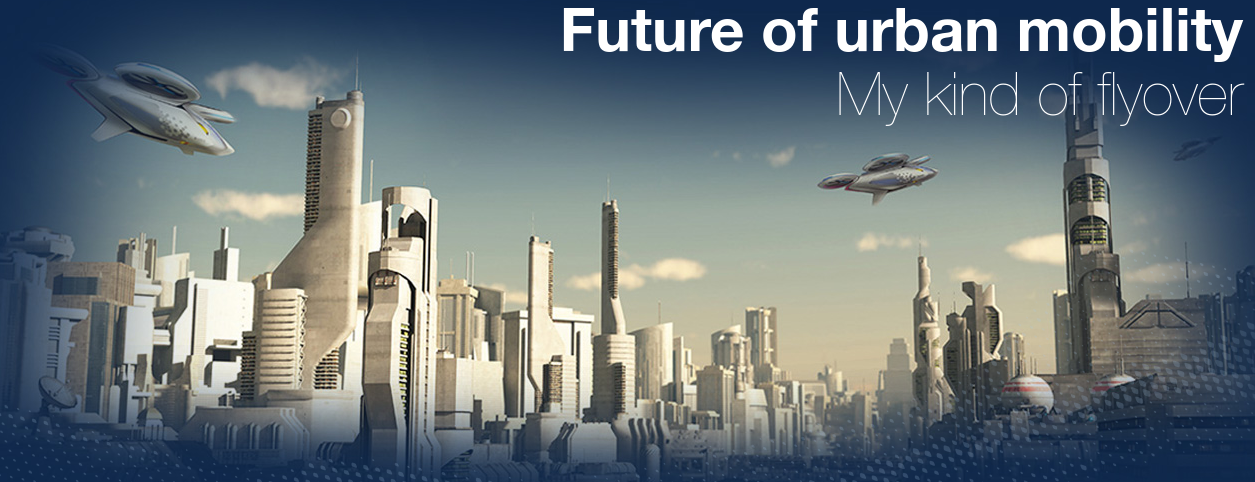 NEWS
NEWS
 NEWS
NEWS
 NEWS
NEWS
What’s cooler than self-driving cars? Self-driving cars that can fly!
Flying, autonomous vehicles have long been a staple of favorite sci-fi flicks like The Fifth Element and Back to the Future, but those who assumed they’d never get the chance to be a passenger in one had better think again – Airbus SAS, the company that makes the jumbo jets, has announced its building a “self-flying taxi” that’s able to fly above city traffic, whisking passengers and cargo to their destinations in double-quick time.
Airbus’s vision might sound a bit Utopian, but believe it or not the company says it’s planning to test a prototype of the vehicle next year, before bringing them to market within just ten years.
Airbus announced its plans in its corporate magazine FORUM, where project executive Rodin Lyasoff asserted that: “In as little as ten years, we could have projects on the market that revolutionize urban travel for millions of people.”
The project, called “Vahana,” was launched earlier this year at A3, which is Airbus’ innovation division located in Silicon Valley. Airbus says it’s already finalized the vehicle’s design, and its engineers are now building the first test vehicles and systems.
No doubt most of us will warm to the idea of flying over the traffic below, but Airbus’ hover taxis may be held up by a few practicalities before they can take to the skies. For one thing, in the U.S., they’ll need to overcome an extremely conservative regulatory landscape that has held back the testing and use of drones and autonomous vehicles. That alone makes the ten-year timeline seem a touch optimistic.
There are also lots of technological barriers to overcome, such as the development of “sense-and-avoid” technology to ensure there are no mid-air collisions during rush-hour. The good news there is that technology has progressed a lot already in the last few years. As little as five years ago, virtually no-one had heard of the concept of self-driving cars, yet now pretty much every major auto maker is investing in their design.
“That’s one of the bigger challenges we aim to resolve as early as possible,” Lyasoff said in regard to collision detection software.
There’s also a much larger consideration: If and when flying cars really do catch on and become affordable, one would assume they would rapidly surpass ground-based cars, and then what? The traffic would shift to the skies, and that would necessitate the creation of entirely new air traffic regulations for flying vehicles.
The Vahana team does seem to be aware of the challenges ahead though. “Our projects are built on rigorous analysis, novel insights, and commitment to unreasonable goals,” it states proudly on its website.
Still, we can take encouragement from the fact that Airbus does actually have more experience than most of working on autonomous aircraft projects. Its Skyways division is currently building a drone delivery service that it’s set to test in Singapore next year, while the City Airbus project is creating an autonomous helicopter service that could be summoned via a smartphone app – a kind of “Heli-Uber” service, or something like that.
The last idea is not at all far-fetched. In Brazil, it’s already possible to summon a ride in a chopper (albeit one with a human pilot) via the UberCopter service.
Although the obstacles in its way are not insignificant, Airbus Group CEO Tom Enders believes that the vision of self-driving, flying cars is not an unrealistic one.
“I’m no big fan of Star Wars, but it’s not crazy to imagine that one day our big cities will have flying cars making their way along roads in the sky,” the CEO said. “In a not too distant future, we’ll use our smartphones to book a fully automated flying taxi that will land outside our front door – without any pilot.”
Support our mission to keep content open and free by engaging with theCUBE community. Join theCUBE’s Alumni Trust Network, where technology leaders connect, share intelligence and create opportunities.
Founded by tech visionaries John Furrier and Dave Vellante, SiliconANGLE Media has built a dynamic ecosystem of industry-leading digital media brands that reach 15+ million elite tech professionals. Our new proprietary theCUBE AI Video Cloud is breaking ground in audience interaction, leveraging theCUBEai.com neural network to help technology companies make data-driven decisions and stay at the forefront of industry conversations.